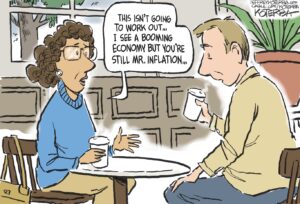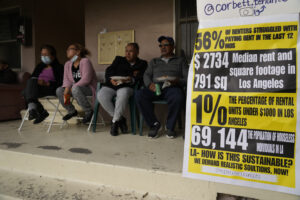No Time to Argue About the Economy
With the economy teetering on recession, there's a way out of the usual political impasse, if the politicians want to find it.WASHINGTON — Now that even the Bush White House sees grim economic news as a sign that perhaps we should do something besides pretend things are rosy; now that Republicans on Capitol Hill sense in the broadening of economic bitterness the latest peril to their hold on even safe seats; now that Democratic congressional leaders are pledging to work with a president who has thwarted them for a year, does this all mean we are about to hold hands and help Americans out of their economic stress?
Probably not.
We are more likely to watch a nasty rerun of economic battles past, one that may go on for so long that a stimulus package will come too late in the economic downturn to churn up anything but hot air. If history — and early hints from the White House — is any indicator, the fight is going to be over a couple of false arguments we’ve heard before.
The first rests on the unshakable belief among Republicans that tax cuts, and never direct government spending, are the only way to stimulate the economy. This was pretty well disproved by the New Deal, not to mention the deficit spending that has helped to prop up the economy during most of the Bush presidency.
The second fight is almost certain to be over who should get a tax cut or one-time rebate to be included in any stimulus package. This is a more obscure battle. But it is significant. Democrats will likely argue that millions of taxpayers who generally earn $30,000 or less, and who pay Social Security and Medicare payroll taxes but don’t necessarily make enough to pay income taxes, should get a piece of whatever Washington doles out. Republicans often deride this idea as something akin to giving a tax cut to people who don’t pay taxes.
The way out of the impasse is pretty easily found — if politicians want to find it.
Most economists agree that some of those who receive tax cuts save all or part of the extra money. It doesn’t take a Nobel laureate to realize that those most likely to save the extra bucks have higher incomes than those who would spend all of it. Common sense dictates that any tax cut meant to stimulate spending — which is, after all, the point — must be targeted toward middle- and lower-income earners. Wal-Mart shoppers deserve a tax break in part because they’ll spend it. Saks shoppers, not so much.
Even so, consumers are likely to spend at least some of their tax cuts on imports, according to Larry Mishel, president of the Economic Policy Institute. That, he argues, doesn’t prod job creation at home, as would — gasp! — direct government spending on road repairs and other public works projects. In truth, we haven’t the time to fight this enduring argument, which not only splits the two parties but can divide Democrats into antagonistic camps. But that doesn’t mean a temporary, targeted increase in government spending can play no role.
The coming recession, if we have one, has its roots in high energy costs that are forcing consumers to cut back on other spending, and in the mortgage meltdown that has struck hardest at homeowners of modest means. Since skyrocketing energy prices are an urgent problem, pumping money into federal fuel-assistance programs makes sense. Aid to those at risk of losing their homes to foreclosure does, too, and for some of the same reasons.
But some ideas make no sense at all unless what you’re really intending is a sop to campaign donors and ideological soul mates. One gaining currency among Republicans is a business tax cut meant to spur investment in productive equipment. But the immediate problem isn’t lax production. It’s that people aren’t buying goods that already are on the shelves and in the showrooms. More preposterous is the notion that making permanent the tax cuts passed early in Bush’s tenure could now become a quick fix. It won’t be the first time the Bush tax cuts, which began as a campaign promise during the 2000 primaries to thwart other Republicans, have rhetorically morphed into an all-purpose elixir. But at least now this falsity can be exposed in a glance: The tax cuts already are in effect, so making them permanent after 2010 — presumably after any recession has passed — helps no one this year.
And help, if offered, must be delivered now and not, say, in October — the month when politicians most want to deliver it.
Marie Cocco’s e-mail address is mariecocco(at)washpost.com.
© 2008, Washington Post Writers Group
Your support matters…Independent journalism is under threat and overshadowed by heavily funded mainstream media.
You can help level the playing field. Become a member.
Your tax-deductible contribution keeps us digging beneath the headlines to give you thought-provoking, investigative reporting and analysis that unearths what's really happening- without compromise.
Give today to support our courageous, independent journalists.






You need to be a supporter to comment.
There are currently no responses to this article.
Be the first to respond.